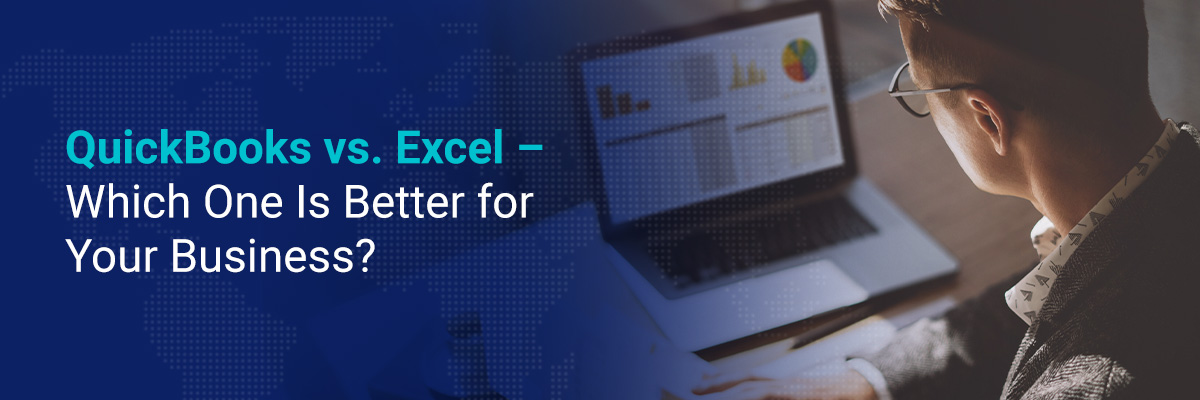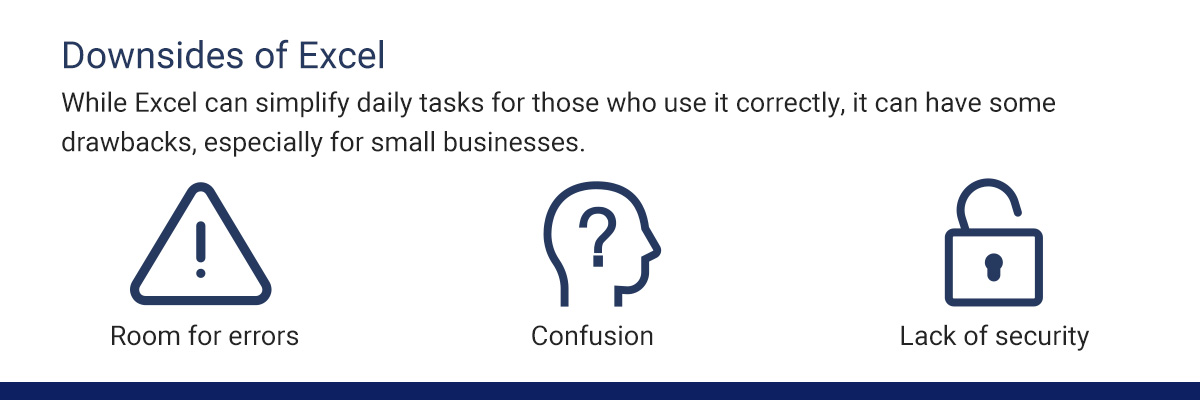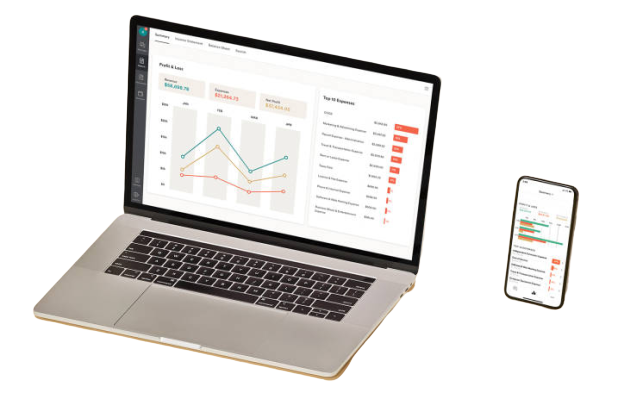
QuickBooks vs. Excel – Which One Is Better for Your Business?
One of the most critical aspects of business is knowing your financial health. Any uncertainties could leave vital revenue on the table. This concern is why companies choose accounting software like QuickBooks to improve their understanding of their business finances. But what about Excel? Let’s review the critical differences between these two programs.
The Breakdown of QuickBooks vs. Excel
Spreadsheet expertise is a valuable talent. Macros, formulas and shortcuts can help you calculate any equation you can think of. The only issue is that these advanced skills have a long learning curve, and one tiny mistake in a spreadsheet can have a disastrous ripple effect. That’s no longer the case with modern accounting software, as anyone can easily learn to use QuickBooks. The tools and reports available with QuickBooks far outstrip its predecessors.
Benefits of QuickBooks Over Excel
What is QuickBooks? By design, this software helps businesses manage their financial health. QuickBooks is an excellent option that makes it a breeze to input your financial records. It can securely integrate with financial apps like bank accounts and credit cards.
QuickBooks also includes helpful features designed for:
- Income management
- Overseeing sales and expenses
- Tracking daily transactions
- Forecasting and budgeting future earnings
- Recording inventory
- Running payroll
- Invoicing customers
- Accepting online payments
- Scanning receipts for expenses
- Supervising tax payments
When comparing Excel to QuickBooks, you’ll notice some marked differences. While Excel requires you to tailor and test your spreadsheets with formulas, QuickBooks comes ready-made for all your accounting purposes.
Your business will benefit from income statements, invoice templates, balance sheet templates and more, leaving you more time to focus on other goals. The projection tools provided with QuickBooks help you stay organized by letting you see accounts payable and receivable all in one location.
Benefits of Excel
Many small business accounting departments and solopreneurs rely on Excel because of its outstanding features.
- Graphical representation: You can see your data in two-dimensional spreadsheets with Excel, making it easier to interpret and far more interesting to look at. The options for representing spreadsheet data in Excel are virtually endless. If you have the know-how, you can create illustrations, charts, tables, graphs and maps.
- Freedom to create: Accounting and creativity typically aren’t synonymous, but Excel gives you the best of both worlds. You can get inventive and imaginative while working on the data, making the software program an ideal workmate. Create financial statements and spreadsheets based on your preferences. When you develop a formula or shortcut that works for you, save it and use it as often as you like.
- Functions and formulas: Excel has over 400 built-in functions you can count on to give you instant solutions for statistical and financial jobs. If you know how to use Excel effectively, it can reduce stress and save time by making your work more efficient.
Downsides of Excel
While Excel can simplify daily tasks for those who use it correctly, it can have some drawbacks, especially for small businesses.
- Room for errors: Excel requires manual data entry, which can open the door to human errors like transposed numbers. In addition to being mistake-prone, manual entry is tedious. Small business ownership can be stressful and require more time to succeed. You might consider different options if you lack the staff and resources to master Excel.
- Confusion: More is not always better. While Excel offers diverse customization options, a lack of familiarity with this program can cause more problems for your company. Smaller businesses with overstretched resources may not have the funds to pay for comprehensive Excel training, leaving employees to figure out complex tasks independently.
- Lack of security: Many people wonder how to keep their Excel spreadsheets safe. While you can make a spreadsheet password-protected or lock specific cells, these approaches do not guarantee document security. Excel lacks the necessary encryption features to keep the data safe from cybercriminals. Knowing this, hackers may try to steal information like financial data and Social Security numbers. Data loss is another challenge Excel poses. If your business does not back up your spreadsheets, you could lose them forever in a data breach or power outage.
Is QuickBooks Better Than Excel? 10 Advantages
When comparing Excel vs. QuickBooks, here are a few reasons QuickBooks has the competitive edge.
- Scalability: QuickBooks is solely for managing your business’ financial health. Instead of trying to “hack” Excel to do what you need, QuickBooks lets you adjust your finances and efficiently account for any price changes, additional products or new employees.
- Reporting and analysis: As modern accounting software, QuickBooks enables you to take advantage of high-impact trends. You can accelerate your business planning, track transactions and interpret data within categories like accounts receivable or accounts payable. When using Excel, you must develop and maintain these processes yourself.
- Historical data: It’s crucial to have an audit trail for your business. QuickBooks’ core functions include forecasting and budgeting. With Excel, you’d need to maintain multiple spreadsheet versions and histories to create an audit trail — making it challenging to identify financial trends.
- Accessibility: Business increasingly takes place outside traditional office settings. With QuickBooks, you can access your financial records from anywhere in the world anytime with a simple login. In contrast, if you have a question about your Excel financials over the weekend and the only copy of a spreadsheet is on someone’s computer back in the office, you’ll have to wait until you get in on Monday morning to check your statements.
- Less room for error: A diverse team of experts builds and checks QuickBooks’ built-in formulas. In Excel, you must craft, create and maintain formulas yourself, which may lead to calculation errors and other mistakes.
- Shorter learning curve: QuickBooks is user-friendly and does not take much time to learn. If you ever decide to outsource your accounting or bookkeeping, your new bookkeeper will have a much easier experience working with QuickBooks instead of figuring out how to transfer your Excel spreadsheet into their ledger.
- Frees up your valuable time: The manual effort required to maintain financial records in Excel spreadsheets may be too time-intensive for a busy entrepreneur. With QuickBooks, you can prioritize other mission-critical areas, grow your business and pursue your passions.
- Automatic imports: You will need to manually enter every business transaction into your Excel spreadsheet. When you follow double-entry bookkeeping practices, you’ll spend twice the time and double your potential for error. QuickBooks automatically imports your transactions, reducing the risk of manual entry mistakes.
- Consistency: Your Excel spreadsheets are more likely to become inconsistent as your small business grows. You may realize there is an error somewhere, but have trouble pinpointing it in a massive workbook. QuickBooks eliminates this risk by keeping everyone on the same page with the most current and accurate financial reports.
- Security: QuickBooks keeps your company’s sensitive financial data safe. With Excel, multiple employees may have access to your saved workbooks. It’s not always easy to find edits or deleted content with different versions floating around.
QuickBooks vs. Excel — the Verdict
Deciding between Excel and QuickBooks largely depends on your needs and preferences. Record-keeping is a vital part of your company’s financial health. While you can choose Excel if your financials are not complex, modern tools like QuickBooks can significantly accelerate your business growth. That’s why we always recommend QuickBooks to our clients.
This software can help you find the dollars you didn’t know you had in the first place. In addition, it can protect your assets, business and employees by providing trend analysis with an easy-to-understand interface.
Does Being QuickBooks Certified Help?
Earning QuickBooks certification can smooth your transition from Excel to QuickBooks. Becoming a QuickBooks ProAdvisor gives you a more comprehensive understanding of QuickBooks’ bookkeeping, payroll and accounting tools and removes most of the guesswork. Certification is also the best way to show your boss or business associates that you are serious about handling the business’ bookkeeping and accounting.
Tackle QuickBooks Confidently With Customized Setup and Expert Training
Steph’s Bookkeeping Service offers various QuickBooks-certified services to prepare you for financial success. Get trained by a certified QuickBooks ProAdvisor who can help you customize your QuickBooks account and prepare you to manage your finances confidently. During your one-on-one training, you’ll receive hands-on experience with the program to find the most efficient and convenient setup for your business. Our QuickBooks expert training can get you up to speed quickly so you can tackle it yourself in the long run.
If you currently rely on Excel for your financial tracking, reach out to Steph’s Bookkeeping Service today. Let us do an evaluation and help you move to a modern accounting system. It’s an honor to help our clients with their finances, and we love watching their businesses grow. Call us at (815)-271-5646 to get started!




